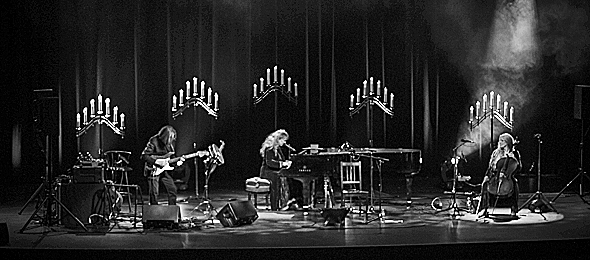Once in a while there comes an opportunity to immerse oneself in a world beyond our own, touched by history and a hint of fantastical magic absent from 90% of the music and media normally at our disposal. At the spacious Paramount Theater in Huntington, Long Island, that chance came on Sunday October 18th, 2015, manifested by a Canadian Celtic-inspired singer by the name of Loreena McKennitt. Long absent from American venues, but ensconced firmly in the hearts of her fans, McKennitt brought her time and space-transcendent power in the form of a unique Trio performance. Featuring Brian Hughes of Edmonton, Alberta on guitar and Caroline Lavelle of Cornwall, England on cello, the simple presentation of souls offered a musical journey that was anything but one-dimensional.
Upon a stage arrayed with five gorgeous candelabras, fans who filled nearly every inch of the cavernous Paramount awaited their beloved singer amid an atmosphere not unlike that before a long-awaited wedding, uniting lovers long kept apart. A grand piano stood at the center of the display, an instrument McKennitt pilots with the smooth perfection of her long years at its helm. At the front of the stage, her Troubador harp rested beneath the soft house lights, a stately vessel of potential energy needing only the touch of her nimble fingers to unleash its sorcery.
Playing two sets of music spanning her lengthy and victorious career, McKennitt indulged the audience not only with music but with her encyclopedic knowledge of history, particularly Irish history. In a voice as soothing as her music, McKennitt prefaced each song with lengthy but engaging historical context. Her professorial tone, as warm and vibrant as her singing voice, informed as it fired the imagination of the audience, who sat raptly during both spoken word and musical performance alike. Fans were offered glimpses into the mind of W.B. Yeats, the renowned Irish poet of the early to mid 20th century. Amidst a stunning collage of “The Wind That Shakes The Barley,” “Emigration Tunes,” and “The Lark in the Clear Air,” McKennitt spoke eloquently of the Potato Famine of the 1840’s, an event that both decimated Ireland’s population and triggered the massive exodus of its people to Canada and the United States. The solemnity and grace of the title track to her latest studio album, cast out in her clear, strong voice, delivered with crystal clarity, the pain of this era. Cavelle wrung emotion from her instrument with a flawless sharpness, while Hughes teased moody atmospherics from his guitar. Each song’s conclusion was greeted by a warm blast of applause from the audience. McKennitt did not just sing and talk of these tragedies; she literally put the audience on the docks of Quebec City as the ships full of starving Irish immigrants rolled in. Orphans, sickly and drawn, scattered among the vacant stares of adults struck with cholera, these experiences were placed front and center in the minds of the gathered fans more poignantly than any textbook, film, or lecture could hope to accomplish.
It was not all bleak, though. McKennitt regaled the audience with a tale from decades past, when she purchased a human skull from an enthusiastic Irish street hawker, who claimed in a thick brogue that it was indeed the skull of Brian Boru, famed Irish high king of old, which she held in her hands. Like children being read a fireside tale, the audience listened as McKennitt told of encountering this same individual years later, selling a more miniature skull and claiming to all in earshot how it belonged to Brian Boru. When she confronted the man, without missing a beat he claimed it to indeed be the skull of Brian Boru – the skull of Brian Boru as a child, of course. The laughter of the audience boomed to the rafters.
Harking back to Ireland’s virgin forests, whose majesty was severely compromised by the shipbuilding industry of the 19th century, “Bonny Portmore” showcased McKennitt’s voice quite magically. As flawless as the recording laid down in 1991 on The Visit studio album, McKennitt’s voice is a timeless treasure that has not lost even a mote of its grace and power.
The closing of the second and final set featured three absolute fan favorites in the form of “The Lady of Shalott,” “The Old Ways,” and “Dante’s Prayer.” McKennitt mesmerized the crowd with the warmth and gravity of her magnificent voice. The synthesis of Hughes’ guitar, Cavelle’s cello, mixed with McKennitt’s piano, the spellbound crowd could only look on in awe. Hughes’ style is very reminiscent of David Gilmour (Pink Floyd), and was a perfect complement to the more Celtic, World Music strains of McKennitt and Cavelle.
A swell of bursting affection from the audience heralded a quick encore, as McKennitt performed “The Never Ending Road” to the gracious and loving crowd. Infrequent visits to The States lent the evening a special quality absent from many performances one might attend, as the crowd hung on every clarion note of McKennitt’s unrivaled voice, and whose spirits were moved by each shiver of the bow of Caroline Cavelle. Leaving the venue, the fans carried with them into the brisk Autumn air a sheen of magic, their spirits limned in the nameless grace of Loreena McKennitt. Many will hold their breath until she next returns to suffuse the human experience with her brand of eclectic sonic mastery.
















No comment